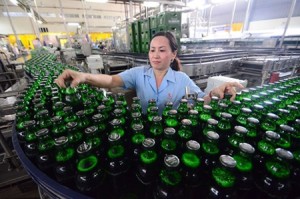The beverage industry contributed VND30 trillion (US$1.3 billion) to the State budget last year, according to the Viet Nam Beer, Alcohol and Beverage Association (VBA).
At a conference held in Ha Noi yesterday, VBA Chairman Nguyen Van Viet said the beverage industry continued to grow over the past five years despite the difficult economic times that have resulted in many other kinds of companies struggling or shutting down.
Besides, the sector also created jobs for dozens of thousands of labourers as well as adequately met the domestic demand with high quality products, enhancing competitiveness amid anticipated rising competition pressure associated with intensive international integration, Viet said.
According to a report of VBA, in 2015, the beverage industry produced over 3.4 billion litres of beer, an increase of 40 per cent compared to 2010.
Viet Nam currently has 129 beer establishments, most of which are concentrated in large cities such as Ha Noi, HCM City, and Thua Thien Hue. The majority of the market share is still controlled by the Sai Gon Beer, Alcohol and Beverage Corporation (Sabeco), the Ha Noi Beer, Alcohol and Beverage Corporation (Habeco) and the multinational breweries Heineken and Carlsberg.
In the reviewed period, non-alcoholic beverages also witnessed an impressive growth with a production capacity of five billion litres per year and more than 1,800 production facilities.
By 2020, the beverage industry is forecast to reach a higher capacity, with 4.25 billion litres of beer, 9.2 billion litres of non-alcohol and 360 million litres of alcohol expected to be produced per year.
While joining the Trans Pacific Partnership (TPP) agreement and other Free Trade Agreements (FTAs) would give Viet Nam the chance to attract more investment, it would also pose a significant challenge, Viet said, adding that domestic beverage companies should enhance their production quality and improve their distribution system to protect their domestic market shares.


